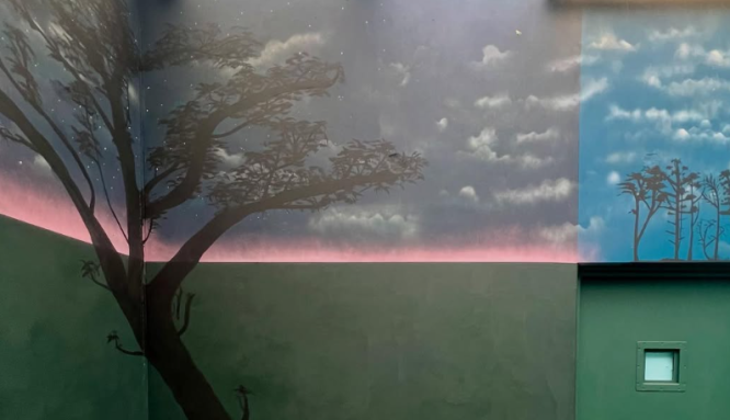A new mural, designed to create a more calming and inclusive environment, has been unveiled inside a Gloucestershire custody suite.
The mural, along with other changes to custody, marks a pioneering step in improving the experience of detainees with neurodiverse conditions.
Designed by Gloucestershire artist Murmur, it features soft colours, a night and day transition, abstract patterns and targets that detainees can use to distract themselves, with ball games and tranquil imagery to reduce anxiety and overstimulation in the custodial environment.
It is known that custody suites can be highly stressful, especially for people with conditions such as autism, ADHD or sensory processing sensitivities.
To tackle this, the custody area also now has a dedicated quiet cell for people who find the echoing and noises overwhelming.
A picture book that walks a detainee through the types of uniforms and items they may come across within custody has also been created to help give people prior understanding of the process.
The mural was officially revealed on Monday 7 July 2025 with representatives from the Office of the Police and Crime Commissioner, Gloucestershire Constabulary, a neurodiversity advocacy group and the artist in attendance.
Murmur said: 'Not gonna lie, it feels a bit odd having a police inspector and the crime commissioner cutting a ribbon to 'open' my latest mural painted inside a yard used by detainees in police custody.
'But there’s more to this one than meets the eye. Colours and imagery all have an impact on your limbic system and a part of your brain called the amygdala and to some extent the prefrontal cortex.
'In other words – it can calm you down. The mural was designed with neurodiverse people in mind, who may be more stressed than most at the prospect of being in custody.'

Police and crime commissioner for Gloucestershire, Chris Nelson, said: 'Neurodiverse individuals may experience heightened sensory responses, making the traditional custody environments overwhelming.
'This mural is a small but meaningful step toward making the experience more trauma-informed. Detainees are not prisoners and are innocent until proven otherwise.
'People who are detained in custody are some of the most vulnerable in society. Making small changes to how we treat them can have big impacts.'
Custody inspector Andy Miller added: 'When somebody is in custody, their welfare is of paramount importance and we want to make sure we’re doing all we can to minimise the impact of detention.
'We’ve recognised there’s a need to make changes to the sensory demands in the custody environment to accommodate people with neurodiversity and the new, calming mural is one of the steps we’ve taken to reduce the stress and anxiety many might feel.
'We hope this will have a positive impact on neurodiverse individuals and they will feel better supported and understood by police.'

















